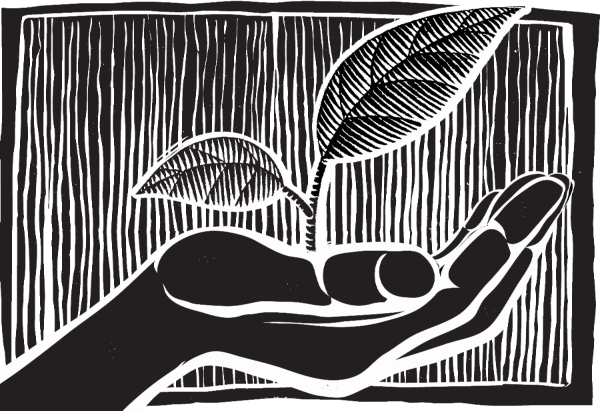Farmers agree: In the Valley, the days of large-scale commercial farming are all but gone. But the trade might survive on a much smaller scale.
Joshua Bowling
Urban farms — which can take up less than an acre and grow unique produce — may be the only farming that lives on, they say.
The small-scale farms work on everything from street corner lots to old freight cars.
…
Urban farms generate radically different products than traditional farms. Traditional farms tend to grow a lot of the same product, so farmers can wholesale them to retailers. Urban farms market straight to individuals and grow more diverse crops in smaller quantities.
Full Article Here

Community Land – A Call to Action!
In today’s economy land has become a commodity, a means to generate revenue. People speculate, they hold onto land to maximize profit. They develop land seeking to create the maximum density allowed by zoning regulations. They extract resources without regard for the damage done to the environment. Investment strategies, both short and long term, seek the highest rate of return.
These practices are not life-affirming. Treating land as a commodity undermines the very fabric of life. Our quest for greater and greater profit leads to misuse of resources, pollution, and the use of machinery and chemicals that kill the essential microbial life that supplies nutrients to all living beings. We are literally killing the very planet that has the potential to sustain us rather than creating thriving ecosystems that give life to all species.
In nature’s economy the currency is not money, it is life.
-Vandana Shiva
How we occupy the land and how it is being used are questions that desperately need to be addressed. We need to reconsider our land tenure and how we exist as a species on this planetary body. We need to totally rethink our motives for using anything that comes from the earth: mineral, vegetable and animal. If you look closely at the challenges the earth currently faces, we see the symptoms of planetary destruction everywhere. We see the buildup of carbon in the atmosphere. We see the sixth great extinction of species happening around us. We see the buildup of plastic and other pollutants everywhere. The very fabric of life on the planet hangs in the balance. Is our approach to land tenure life-affirming or are we walking down the path of planetary destruction?
Most people would say that land ownership isn’t the problem. It’s the people, their activity and their greediness that are causing problems. I would argue the opposite. How we establish our tenure on the earth sets the tone for everything.
We abuse the land because we regard it as a commodity belonging to us. When we see land as a community to which we belong, we may begin to use it with love and respect.
-Aldo Leopold
What would it take for us to become true stewards of the earth? The Community Land Trust (CLT) model offers a direction. When we live on land that is a part of a CLT, we enter into a different relationship with the earth, we are no longer owners. We occupy the land through a long-term, inheritable and renewable lease agreement. This lease agreement gives us the right to use but, not abuse the land. We assume a position of responsibility and care.
The Community Land Trust model promotes land tenure based on stewardship of land and its resources for the larger community; ecologically responsible use of land and resources; regeneration of the commons; and the creation of affordable housing, community based agricultural programs, cooperatives and other related initiatives. These programs that serve lower income residents by meeting basic life needs cannot survive without some form of subsidy. Affordable housing and community-based agriculture cannot compete for land that is geared to make the highest possible return for investors. Land that has been removed from the speculative market and designated as a community asset is needed to provide a stable support for these programs.
How do we create community land? We work together!
This requires a basic shift in how we occupy the earth. The ownership model we currently follow is competitive and divisive. We have “haves” and “have nots.” Basic life needs for food and shelter are not being met for many people.
If you really want to make a difference and create a new model, I invite you to join the Arizona Community Land Trust. And don’t just give money! Volunteer your time! Help us reach out to potential sympathetic land donors. Help us research new models that other organizations are creating to provide affordable housing and community agriculture. Help us work with municipal governments to find ways of turning unused municipal land into community land.
And, yes, please give money! We welcome new members! If you haven’t renewed your membership in the past year, please do so. The dues are low ($10 annually) so everyone can participate. If you are able, please consider a monthly contribution – even $5 or $10 a month makes a difference. If we had 1000’s of members giving small rhythmic donations, we would develop a pool of funds that would begin to bring land into community trust.
Now is the time for action! The Valley of the Sun is growing at an alarming rate, adding over 70,000 people per year. If we want to have land available for community agriculture and affordable housing, WE must act now!
We have lived our lives by the assumption that what was good for us would be good for the world. We have been wrong. We must change our lives so that it will be possible to live by the contrary assumption, that what is good for the world will be good for us. And that requires that we make the effort to know the world and learn what is good for it.
-Wendell Berry

